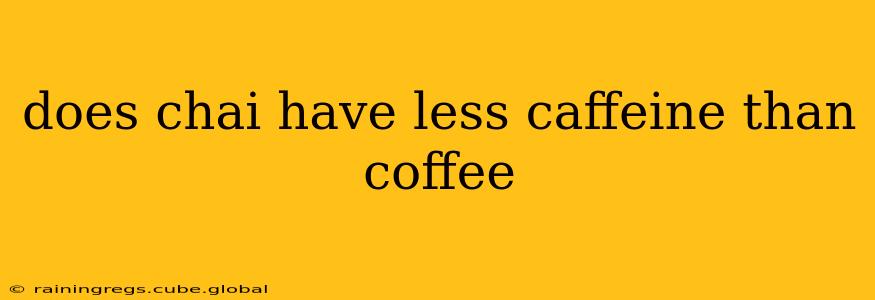Does Chai Have Less Caffeine Than Coffee? A Comprehensive Comparison
The simple answer is yes, generally chai contains significantly less caffeine than coffee. However, the exact amount varies widely depending on several factors. Let's delve into the details to understand why and how much less caffeine you can expect.
Understanding the Caffeine Content Variables:
The caffeine content in both chai and coffee is influenced by several crucial factors:
- Type of Tea: Chai is typically made with black tea, which has a higher caffeine content than green or white teas. The specific type of black tea used will influence the final caffeine level in your chai.
- Brewing Method: Steeper brewing times and higher water temperatures generally extract more caffeine. A strong, long-brewed chai will have more caffeine than a lightly brewed version.
- Coffee Bean Type: Coffee beans vary in caffeine content depending on the species, growing conditions, and roasting process. Arabica beans tend to have less caffeine than Robusta beans.
- Brewing Method (Coffee): Similar to chai, the brewing method for coffee significantly affects its caffeine concentration. Espresso, for example, is generally more concentrated than drip coffee.
- Quantity of Tea/Coffee: The amount of tea leaves or coffee grounds used directly affects the final caffeine content in your beverage. More tea or coffee generally equals more caffeine.
- Additives: Milk, spices, and sweeteners added to chai or coffee don't affect the caffeine content, but they might influence your perception of the beverage's intensity.
How Much Caffeine is in Chai vs. Coffee?
Providing exact numbers is difficult due to the variability mentioned above. However, a general guideline is that:
- A typical cup of coffee (8 oz) contains between 80-100mg of caffeine.
- A typical cup of chai (8 oz) contains between 25-50mg of caffeine.
This shows that chai typically contains roughly half to a third of the caffeine found in a standard cup of coffee.
What About Masala Chai Specifically?
Masala chai, a popular spiced chai variant, typically falls within the same caffeine range as other black tea-based chais. The addition of spices like cardamom, ginger, cinnamon, and cloves does not significantly alter the caffeine content.
Does Decaf Chai Have Caffeine?
Decaf chai, like decaf coffee, undergoes a process to remove most of the caffeine. However, it's important to note that "decaffeinated" doesn't mean completely caffeine-free; trace amounts may remain.
Is Chai a Good Alternative for Coffee Lovers Seeking Less Caffeine?
For those looking to reduce their caffeine intake, chai can be a great alternative to coffee. Its lower caffeine content and rich, flavorful profile make it a satisfying substitute. However, individual sensitivity to caffeine varies, so it's always best to monitor your intake and adjust accordingly.
Can I Make Chai with Less Caffeine?
Yes, you can lower the caffeine content of your chai by using less tea leaves, brewing for a shorter time, or using a lower water temperature. Experiment to find your preferred balance of taste and caffeine level.
What are the Health Benefits of Chai Compared to Coffee?
While both chai and coffee offer potential health benefits due to their antioxidant properties, the precise benefits and drawbacks depend heavily on individual factors. Each drink offers a unique profile of antioxidants and other compounds. It's best to consult with a healthcare professional for personalized advice.
In conclusion, while the exact caffeine content varies, chai generally boasts significantly less caffeine than coffee. This makes it a suitable alternative for those wanting a warm, flavorful beverage with a lower caffeine kick. Remember that moderation is key, regardless of your chosen beverage.
